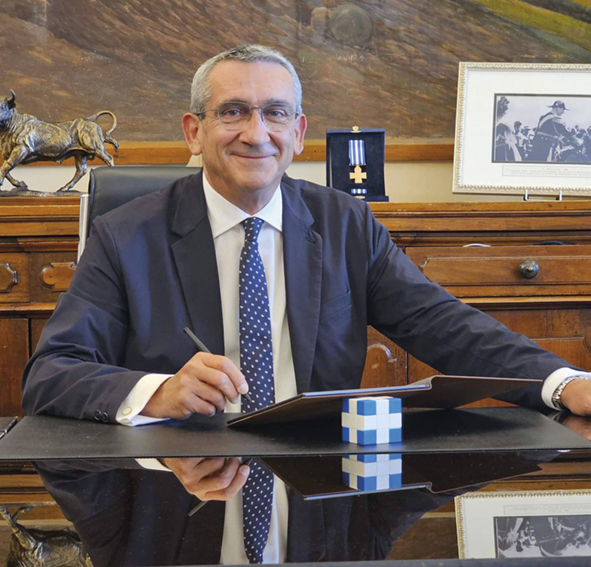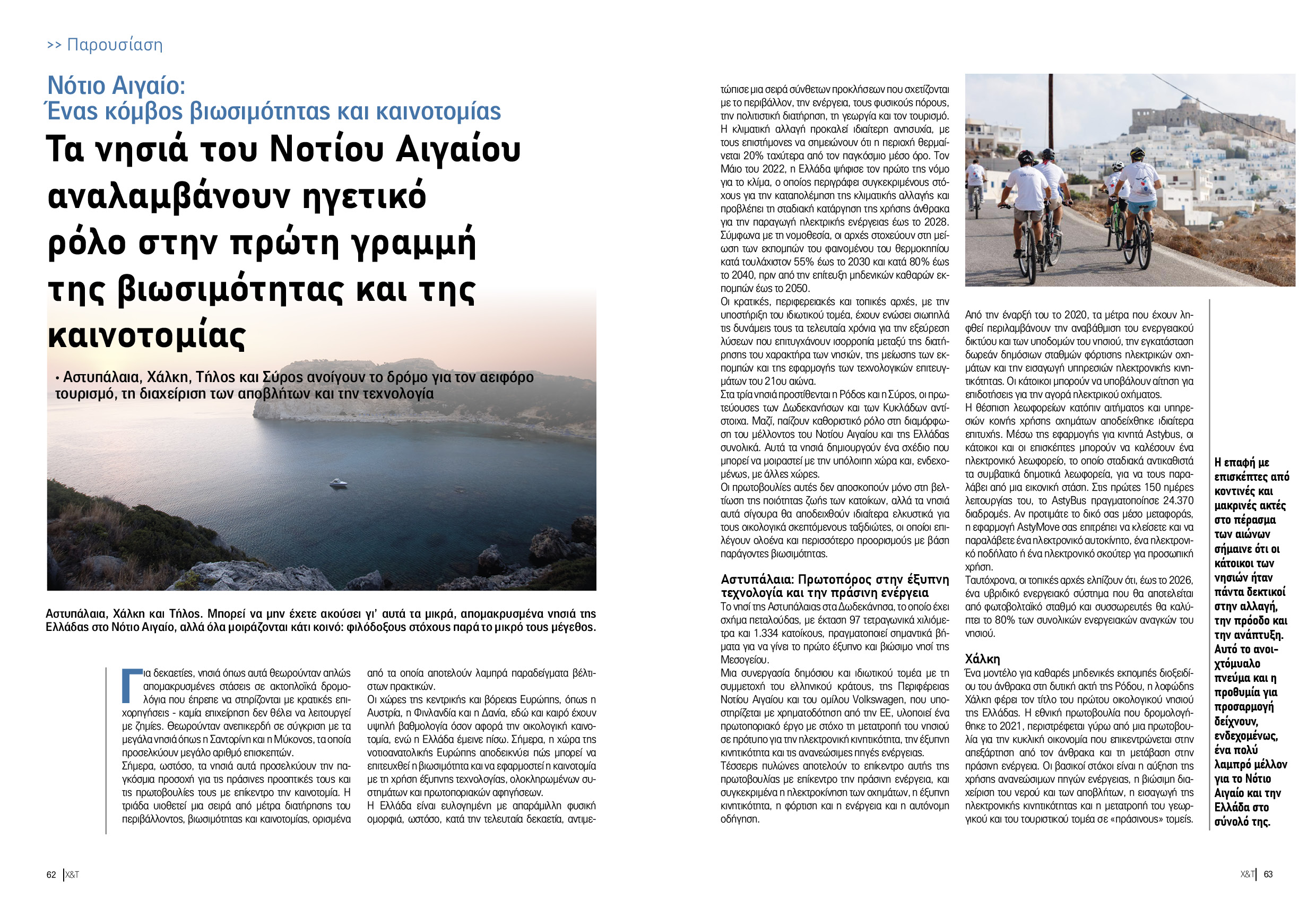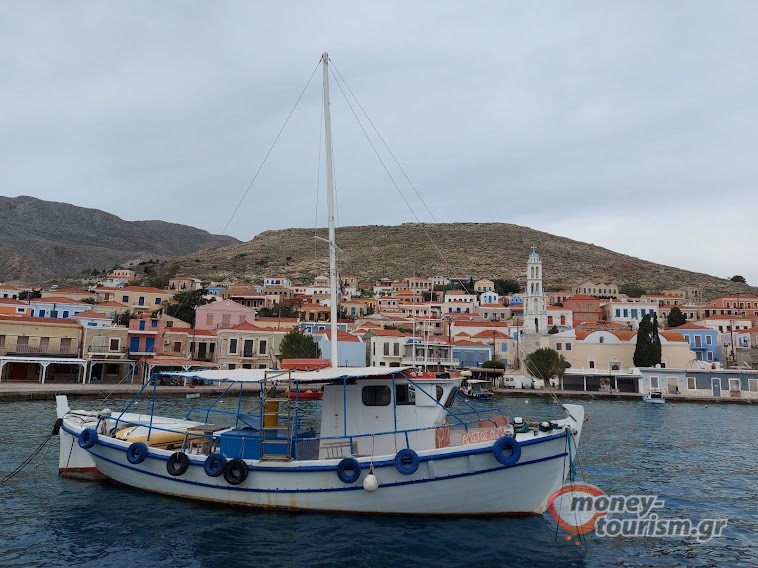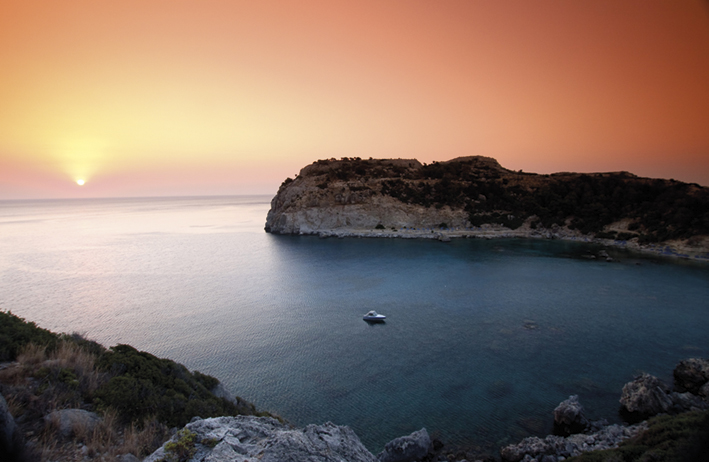-The South Aegean islands take a leading role at the forefront of sustainability and innovation
-Astypalaea, Halki, Tilos and Syros pave the way for sustainable tourism, waste management and technology
Astypalaea, Halki and Tilos. You may not have heard of these small, remote Greek islands in the South Aegean, but they all share something in common: ambitious goals despite their small size.
For decades, islands like these have been considered merely remote stops on ferry routes that had to be supported by state subsidies – no business wants to operate at a loss. They were considered unprofitable compared to the big islands like Santorini and Mykonos, which attract large numbers of visitors.
Today, however, these islands are attracting global attention for their green prospects and innovation-focused initiatives. The trio is adopting a range of measures of environmental conservation, sustainability and innovation, some of which are shining examples of best practice.
 Central and northern European countries, such as Austria, Finland and Denmark, have long had high scores for eco-innovation, while Greece has lagged behind. Today, the south-eastern European country is demonstrating how sustainability can be achieved and innovation implemented using smart technology, integrated systems and innovative narratives.
Central and northern European countries, such as Austria, Finland and Denmark, have long had high scores for eco-innovation, while Greece has lagged behind. Today, the south-eastern European country is demonstrating how sustainability can be achieved and innovation implemented using smart technology, integrated systems and innovative narratives.
Greece is blessed with unparalleled natural beauty, yet over the last decade, Greece has faced a number of complex challenges related to the environment, energy, natural resources, cultural preservation, agriculture and tourism. Climate change is of particular concern, with scientists noting that the region is warming 20% faster than the global average. In May 2022, Greece passed its first climate law, which outlines specific targets to combat climate change and calls for the phasing out of the use of coal for electricity generation by 2028. Under the legislation, the authorities aim to reduce greenhouse gas emissions by at least 55% by 2030 and 80% by 2040, before achieving zero net emissions by 2050.
State, regional and local authorities, with the support of the private sector, have tacitly joined forces in recent years to find solutions that strike a balance between preserving the character of islands, reducing emissions and implementing 21st century technological advances.
The three islands are joined by Rhodes and Syros, the capitals of the Dodecanese and Cyclades respectively. Together, they play a key role in shaping the future of the South Aegean and Greece as a whole. These islands create a blueprint that can be shared with the rest of the country and possibly with other countries.
These initiatives are not only aimed at improving the quality of life of local residents, but these islands will certainly prove to be particularly attractive to eco-minded travellers, who are increasingly choosing destinations based on sustainability factors.
Astypalaia: A pioneer in smart technology and green energy
The butterfly-shaped island of Astypalea in the Dodecanese, with an area of 97 square kilometres and 1,334 inhabitants, is taking important steps to become the first smart and sustainable island in the Mediterranean.
A public-private partnership involving the Greek state, the South Aegean Region and the Volkswagen Group, supported by EU funding, is implementing a pioneering project to transform the island into a model for e-mobility, smart mobility and renewable energy.
Four pillars are at the heart of this green energy-focused initiative, namely vehicle electrification, smart mobility, charging and energy and autonomous driving.
Since its launch in 2020, measures taken include the upgrading of the island’s energy network and infrastructure, the installation of free public charging stations for electric vehicles and the introduction of e-mobility services. Residents can apply for subsidies for the purchase of an electric vehicle.
The introduction of on-demand buses and car-sharing services has proved to be very successful. Through the Astybus mobile app, residents and visitors can call an e-bus, which is gradually replacing conventional municipal buses, to pick them up from a virtual bus stop. In its first 150 days of operation, AstyBus made 24,370 trips. If you prefer your own means of transport, the AstyMove app allows you to book and pick up an e-car, e-bike or e-scooter for personal use.
At the same time, local authorities hope that by 2026, a hybrid energy system consisting of a photovoltaic station and batteries will cover 80% of the island’s total energy needs.
Halki
A model for net zero carbon emissions on the west coast of Rhodes, the hilly Halki bears the title of Greece’s first eco-island. Launched in 2021, the national initiative revolves around a circular economy initiative focused on decarbonisation and the transition to green energy. The key objectives are to increase the use of renewable energy sources, sustainable water and waste management, the introduction of e-mobility and the transformation of the agricultural and tourism sectors into “green” sectors. What is particularly impressive is that, through the GR-eco islands programme, the island is one of the few places in the whole world that have achieved a zero carbon footprint. That is, the amount of greenhouse gas emissions is offset by an equivalent amount. This is not only a critical step forward for the region, but also a bold challenge for the country and the world at large.

A 1MW photovoltaic power plant has been installed in Halki, allowing virtual net metering and offsetting of energy costs for residents and businesses, who are part of an energy community. Many have seen significant reductions in their electricity bills and some have even received credits.
Smart street and architectural lighting, electric vehicles and mobile device charging through a smart counter are among the aspects of the program. Residents are offered incentives to replace conventional vehicles with electric ones and have access to telemedicine services.
Halki is an example of what can be achieved when local communities and the private sector work together to find solutions to critical issues through the adoption of new technologies and low-carbon energy applications.
Tilos: certified for zero waste
With an area of just 63 square metres, the pristine Tilos may be tiny, but the rocky island of the Dodecanese is leading the way in the region by adopting a circular economy mentality. In July 2023, it was declared the first island in the world with zero waste certification. In just two years, Tilos has reduced its landfill disposal rate from 87% to zero.
Just Go Zero Tilos, a pioneering integrated waste management programme, was launched in December 2021 and includes the closure of the island’s landfill. The programme is being implemented by the Municipality of Tilos in collaboration with Polygreen and the South Aegean Region, with the aim of making the island waste-free.
Through the programme, all waste is collected and, based on the principles of the circular economy, reused in order to eliminate its environmental footprint. Residents and business owners sort their waste into bins which are collected from their doorstep on specific days and taken to the Centre for Circular Innovation. There, recyclables are separated and packaged and non-recyclables are sent for waste-to-energy conversion. Organic waste is converted into fertilizer.
Locals can even track recycling efforts through a mobile phone app. Visitors are also required to follow the rules. They are provided with instructions on how to sort their waste. Old clothes, appliances and furniture find new life at the Creative Recycling Center.
The island’s 780 inhabitants have achieved an astonishing 90% waste recycling rate, more than double the EU average of around 40%. According to the South Aegean Region, Tilos has the highest recycling rate of any municipality in the world. Tilos aims to produce 20% less waste, use 30% less plastic and recover 90% more waste by 2025. The pilot system is complemented by a hybrid solar and wind power generation system, with energy storage in batteries, which meets the needs of the port city of Livadia, home to around 500 people.
Polygreen was so successful in Tilos that it is now implementing a similar programme in Abu Dhabi.
Rhodes: paving the way for sustainable tourism
The rapid growth of the Greek tourism industry over the last decade has led to issues such as overcrowding in popular destinations and locations and pressure on public infrastructure. Fully aware of these challenges, the South Aegean Region has taken the initiative to research, design and implement measures to make sustainable tourism a present-day reality rather than a distant utopia.
In early 2022, the region signed a strategic partnership agreement with leading tour operator TUI and the TUI Care Foundation to create The Rhodes Co-Lab. The aim was to bring together tourism industry stakeholders to find solutions and create a holistic sustainable business model for travel destinations worldwide. Its three main pillars focus on regenerating the natural environment, enhancing social development and cultural heritage and promoting inclusive economic growth in tourism. Within these pillars there are six strategic priorities and 26 measures aimed at making Rhodes climate neutral in 2030, 20 years ahead of the national target.
A comprehensive, progressive plan designed to focus on green growth and address vital issues such as quality of life, infrastructure development, biodiversity restoration, social cohesion and prosperity is already underway. Among the initial priorities, which will be supported with European and national funding, are reforestation, pollution reduction and the introduction of environmental education programmes for children. The key to a favourable outcome is the active involvement of the community in the consultations. Plans include the creation of an international centre for sustainable tourism development, whose main role will be to create and implement best practices and policies for sustainable tourism worldwide.
Syros: creating a new technology and innovation hub
In January 2023, Syros welcomed the Aegean Neorion Innovation Centre (ANIC), a collaboration between the South Aegean Region, Onex Group & Technologies, Cisco and the University of the Aegean. The centre was created for several reasons: primarily to research, design and implement innovative solutions to the challenges faced by local communities. ANIC is a dynamic, modern technology and innovation ecosystem, whose aim is to act as a key hub for the development of value-added technological solutions at regional and national level.
It was established to provide local businesses with innovative solutions and help them in their digital transformation, while bringing new technologies to areas such as education, health and the environment.
ANIC’s first project involved the transformation of Syros General Hospital into a safe, green and smart facility. Tablets and mobile phones have eliminated the use of forms, while sensors track the number of visitors and prevent overcrowding. Smart meters monitor environmental parameters and help reduce energy consumption.
Tilos, Halki and Astypalaia are at the forefront of Greece’s efforts towards sustainability and innovation and are proof that small can certainly be powerful. At the same time, Rhodes and Syros are becoming incubators and think tanks for sustainable tourism and technology, respectively, whose impact could well be global.
Contact with visitors from near and distant shores over the centuries has meant that islanders have always been receptive to change, progress and development. This open-minded spirit and willingness to adapt potentially points to a very bright future for the South Aegean and Greece as a whole.




